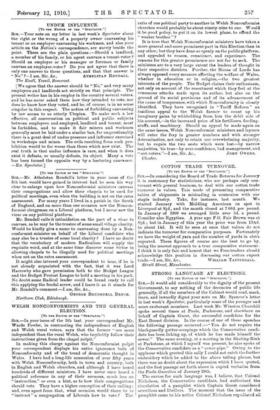UNDUE INFLUENCE.
rro THE EDITOR or THE " SPECTATOR."] SIR,—Your note on my letter in last week's Spectator about the right or the wrong of a property owner canvassing his tenant or an employer canvassing his workmen, and also your article on the Nation's correspondence, are surely beside the point. These are the plain questions :—Should a landlord, a member of his family, or his agent canvass a tenant-voter ? Should an employer or his manager or foreman or family -canvass an employee-voter? Do you not agree that there is only one answer to these questions, and that that answer is " No" P—I am, Sir, &c., ATHELSTA N RENDALL. The Knoll, Yeovil, Somerset.
[We agree that the answer should be "No," and very many employers and landlords act strictly on that principle. The present writer has in his employ in the country several voters, and he has never asked them how they intended to vote, nor does he know how they voted, and he, of course, is in no sense singular in this respect. The notion of forbidding canvassing by law seems to us utterly Utopian. To make such a law effective, all conversation on political and public subjects between employers and employed, landlord and tenant, must be forbidden, and to make it fair miners and workmen generally must be laid under a similar ban, for unquestionably there is a great deal of undue pressure and influence exercised in workshops and mines. The evils resulting from such pro- hibition would be far worse than those which now exist. The real truth is that undue influence is rare, and when it does exist it defeats, or usually defeats, its object. Many a vote has been turned the opposite way by a hectoring canvasser. —ED. Spectator.]










































 Previous page
Previous page